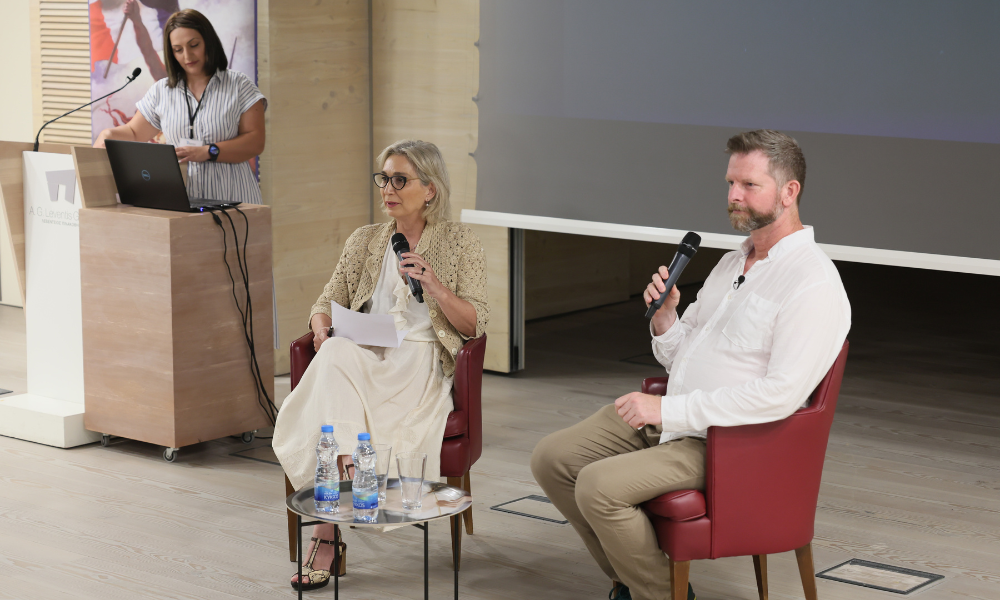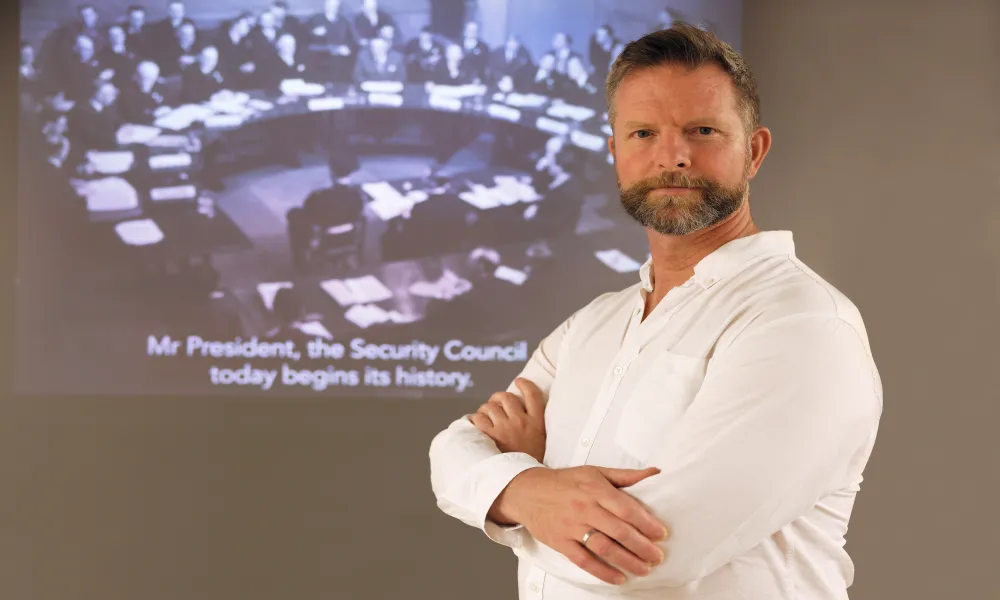Just as this interview was ready to be published, the “Security Council held its 10,000th meeting, and yet another veto on Gaza was cast by the US, blocking three demands: a ceasefire, the release of hostages, and the flow of humanitarian aid”. Filmmaker Tim Slade pointed out, with a heavy heart, the bitter coincidence as his documentary, The Veto, confronts this very pattern.
He has long been drawn to the intersection of war, justice, and cultural survival. His 2016 documentary The Destruction of Memory traced how conflict destroys heritage as well as human lives, with Syria providing one of the clearest examples.
During screenings of that film, he noticed something recurring in the discussions: the number of United Nations Security Council vetoes that had blocked action on Syria. Between 14 and 18 vetoes had halted measures that might have protected civilians and preserved cultural heritage. He began to see the veto as more than a political tool. It had become an obstacle to justice itself.
That observation grew into his new documentary, The Veto. Where his earlier film had encountered the veto incidentally, this project places it at the centre of the narrative. He describes it as an attempt to capture the dysfunction surrounding the system and the paralysis it creates within the UN. In an interview with Politis to the point, Tim shed light on the origins, the makings, and the impact of The Veto, emphasising the much-needed urgency to rethink how powerful nations can exercise their right and power to veto.
Two recent conflicts gave urgency to the idea. Russia’s invasion of Ukraine in February 2022 which demonstrated the ability of a permanent Security Council member to shield itself from accountability while committing aggression. The renewed violence in Gaza after October 7th, 2023, produced the same result, with calls for humanitarian measures again blocked.
For Tim, these moments illustrated how the veto erodes trust in the international system. The public sees a country engage in actions condemned by many nations while retaining the power to prevent meaningful response. His film seeks to make that failure visible, a message that resonates not only in Ukraine or Gaza but also in Cyprus, where decades of diplomatic paralysis have left communities divided and resolution out of reach.
A question of justice
The film asks how justice can exist when some nations are shielded from accountability. He argues that equality under international law is fundamental. In the case of Israel and Palestine, he points to the way vetoes have allowed one party to operate outside the structures of law. The International Criminal Court’s pursuit of arrest warrants raised immediate debate, yet he sees that debate as a sign of avoidance rather than a genuine attempt to seek solutions.
Diplomatic resolution, in his view, must be pursued with seriousness and urgency. Avoidance fuels instability, and instability only multiplies suffering. For decades, Palestine has remained unsettled, with UN member states unable to agree on meaningful steps. When powerful nations disengage from dialogue or block initiatives, smaller states lose incentives to participate as well.
The erosion of multilateralism concerns Tim deeply.
"Groups such as BRICS present themselves as alternatives to the UN, which suggests the original forum is losing traction, but these groups can tend to lose traction themselves. Attendance at UN meetings by major powers has diminished, which sends a signal that commitment is optional. Smaller countries are left in precarious positions, relying on the goodwill of larger powers without the safety net of shared institutions."
The sense of responsibility carried by nations such as France stands in sharp relief, and Tim highlights French ambassador Nicolas de Riviere's recognition that great power must be matched by great responsibility.
He also notes a shift outside traditional diplomacy. Civil society is alert to the stakes, particularly with nuclear capability and resource scarcity raising the risks of conflict. Private actors, from multinational corporations to billionaires, are acquiring political influence on a scale that rivals states. For Tim, this growth of non-state power makes the need for an effective UN even more pressing.
The stillness of the chamber
One of the film’s defining images is the stillness of an empty UN Security Council chamber. The shot emerged when the UN provided him with B-roll footage: a static, clinical perspective. The absence of life in the frame became meaningful. Tim pushed for access to film inside the chamber himself to create a visual record of the institution’s remoteness.
At a screening in Geneva, discussion turned to Article 109 of the UN Charter. The article requires a review of the Charter within ten years of its adoption, a review that has never taken place. For Tim, this neglect represents another form of institutional paralysis. The Charter should function as a living document, revisited and revised as circumstances demand. Instead, the chamber remains frozen, its rituals unchanged even as global crises multiply.
Through his conversations with diplomats, he also became aware of the performative aspect of the UN.
"Martin Kimani, Kenya’s ambassador during Kenya's elected term on the Council in 2021-2022, trained as an actor, and describes the chamber as a stage. Speeches delivered inside the room carry passion and accusation, yet the follow-through outside the chamber can be limited. That theatricality became another thread of the film, showing how words and actions often diverge."
Human stories behind the politics
Tim sought to avoid abstraction by grounding the film in human experience. Many of the diplomats and experts he interviewed carried histories shaped by violence and displacement. These early experiences informed their careers, even if they were not always shared publicly.
Jennifer Trahan’s mother, for example, survived by hiding in Berlin during the Second World War. Prince Zeid of Jordan, President and CEO of the International Peace Institute, recalled fleeing gunfire as a child and later working through the aftermath of the Balkan wars. Their careers carry the weight of those experiences, and their presence on screen reflects the determination shaped by them. Tim describes this as the emotional current that gives the film its weight. Even when not directly discussed, the memories inform the urgency of their arguments.
The seriousness of politics
Among the interviews that shaped his perspective, two stand out. Martin Kimani’s reflections on diplomacy as performance highlighted how easily the chamber drifts from real-world urgency. Larry Johnson, a former UN legal officer, emphasized that politics at the UN is not a game, even though it is often treated like one. For Tim, those insights underscored the seriousness of the institution’s responsibilities and the dangers of detachment.
Tim learned that at times, diplomats are taken on official visits to conflict zones. These trips, designed to give representatives direct exposure to crises, remind them of the stakes that cannot be understood from the comfort of the chamber. The lived reality of conflict became another layer of the film’s narrative.
Erosion of trust
The misuse of the veto feeds mistrust in the UN itself. Tim points to repeated U.S. vetoes on resolutions relating to Gaza, often justified by disputes over wording. Behind the language, he sees a strategy of blocking ceasefire efforts and delaying action in situations where delay costs lives. International law experts such as Jennifer Trahan, NYU Center for Global Affairs; author, Existing Legal Limits to Security Council Veto Power in the Face of Atrocity Crimes, suggest turning to the International Court of Justice to challenge veto practices, though many states hesitate for fear of inconclusive rulings.
For Tim, caution is increasingly difficult to defend. Generations grow up under the shadow of nuclear risk, a reality he sees echoed in his own family. His nephew, only nineteen, speaks of nuclear war as a tangible concern, mirroring the fears he himself carried as a child. The weight of that anxiety spreads through civil society, while the Council often appears insulated from it.
Cyprus and the demand for reform
Cyprus stands as a vivid example of what prolonged inaction looks like. Decades after its division, the island remains suspended between negotiation and stalemate. He sees Cyprus as part of a wider pattern in which justice is withheld because decisive moves are avoided at the global level. The persistence of division reflects the same paralysis his film examines: the veto blocks movement, and unresolved conflicts linger for generations.
For him, Cyprus is not only an illustration of the problem but also a potential voice for reform. Smaller states can carry weight when they speak collectively, and Cyprus has the lived experience to argue for accountability. Tim wonders why more small states have not taken up that role, crafting a “hero story” around themselves as champions of reform. By demanding change and aligning with other small nations, Cyprus could help break the fatigue that has left the UN stagnant.
He believes that moments of reform are possible. Article 109 of the Charter, renewed recourse to the International Court of Justice, and initiatives like Liechtenstein’s demand for veto explanations all represent pathways forward. The filmmaker hopes that by 2026 concrete steps will emerge. For Cyprus, those reforms are not abstract. They are the difference between a future shaped by international rule of law and a future trapped in cycles of unresolved conflict.
Who needs to see the film
Tim argues that diplomats remain the most urgent audience for The Veto. They hold the authority to enact reform, and screenings are already reaching missions from smaller states. France has shown openness, while the UK remains hesitant, and the three largest powers, China, Russia, and the United States, have yet to engage. Civil society also plays a role, applying pressure that governments cannot easily ignore.
For Tim, the message is unambiguous: the UN must be fought for. Its institutions must adapt or risk collapse. If the veto continues to paralyze action, smaller states will bear the consequences most of all. Cyprus, caught for decades in the consequences of diplomatic avoidance, knows those stakes better than most.

Photo by Antonis G. Antoniou
Tim Slade held a screening earlier this year at the Leventis Gallery, made possible with the support of philanthropist for peace Cleopatra Kitti, and hosted by Politeia, centre for socio-political studies in Cyprus. The 30-minute screening was followed by a panel discussion with politics and policy experts Anna Koukkides Procopiou and Dr. Andreas Mavroyiannis.
